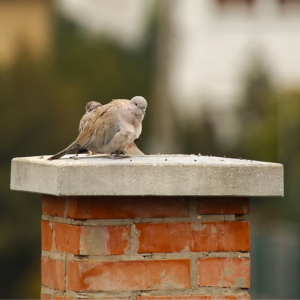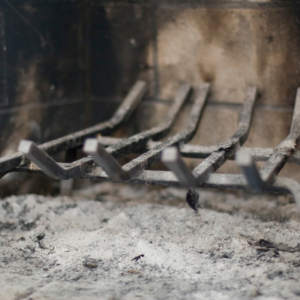Are you noticing bad odors escaping from your chimney? There’s no denying this isn’t ideal, and it can turn a cozy evening indoors into an unpleasant experience within minutes. The good news is, no matter what is causing the odors, there is likely a solution we can implement to get you back where you need to be.
That said, we’ll have to get to the bottom of the cause before we can move forward. If you’re noticing nasty smells in your fireplace, don’t wait to call us in for an inspection. We’d be happy to help you with it all!
1. Creosote Build-Up
One of the biggest causes of foul chimney odors is creosote build-up. Creosote forms in wood-burning systems as fires are burned, and if enough accumulates, you’ll notice a strong, smoky smell (or maybe even a tar-like smell) coming from your chimney. Creosote is also known for its flammable nature, meaning the more you have the higher your chances are of experiencing a chimney fire.
This is why sweeps always encourage homeowners to invest in regular sweepings. If creosote is the source of your odors, a thorough chimney sweeping is sure to make a big difference!
2. Animals in Your Flue
 Another big cause of stinky fireplaces is animals in the flue. Your chimney lends an ideal spot for woodland critters and birds to hunker down and build nests for their young. It’s warm, sturdy, and it keeps them safe from predators, so they’re happy to try and claim it. Unfortunately, their feces, along with many of the materials they bring in, can cause bad odors to form quickly.
Another big cause of stinky fireplaces is animals in the flue. Your chimney lends an ideal spot for woodland critters and birds to hunker down and build nests for their young. It’s warm, sturdy, and it keeps them safe from predators, so they’re happy to try and claim it. Unfortunately, their feces, along with many of the materials they bring in, can cause bad odors to form quickly.
Along with this, all too often the animals can’t get out once they enter and end up passing away. Not only does this stink the space up, but it also invites other pests into your system, which leads to even more problems.
This is another case where a sweeping will help immensely. Your sweep can clear out any debris buildup, then ensure you’re set up with a quality chimney cap, so no animals can re-enter down the line.
3. Water-Related Issues
Are the smells coming from your flue giving off a mustier, damp-like smell? Then, it’s likely that there are leaks in your system causing water to pool up. Water in your system also causes any debris buildup or creosote to smell worse, too.
Excess water in your chimney can also lead to issues like rotted woodwork, rusted metal components, deterioration throughout your liner and masonry, clogging, mold growth, and more. If you have moisture problems throughout your chimney and fireplace, investing in repairs and preventative maintenance (like waterproofing) as soon as possible is a must.
4. Backdrafts & Poor Airflow
If you experience a lot of downdrafts swooping through your chimney, this not only affects the smell of your living space… it affects the temperature of it, too! This is especially noticeable in the wintertime when cool winds are flying through your warm and cozy living space.
One cause of downdrafts or poor airflow is a dirty chimney, in which case, yet again, a sweeping is always a good solution. Other times, the installation of a top-sealing damper (or even a new chimney cap) could be beneficial. Top-sealing dampers also help keep your flue warmer, so you don’t get that immediate backdraft when lighting a fire.
5. Leaves & Excess Debris
Like with woodland creatures, leaves, twigs, and other outside debris is known for working its way into your chimney from time to time and clogging things up. These materials can invite plenty of odors (and pests) on their own, but when they get wet the smells can get even stinkier – and the longer they sit, the worse off you’ll be!
If you discover this occurring a lot, it’s likely your chimney cap is damaged or missing. You’ll want a new one installed ASAP, and you’ll always want to schedule a – you guessed it – professional chimney sweeping.
6. Fireplace Ash
Is your firebox loaded with ash? This is another common cause for odors. Fortunately, it has a fairly simple fix, and it’s one you can do on your own without the help of a professional.
To properly and safely clear out ash, you’ll need a metal pail with a lid and a handle, and you’ll want a metal scoop, as well. Scoop the ash into the bucket with the scoop, then tightly secure the lid, so no oxygen can get in and potential ignite leftover sparks or embers. Because these can stay live for days, the bucket should then be placed on a brick or concrete floor outside of the home for at least a few days.
Once they’re safe to dispose of, you’re good to go! Some people simply toss them, but keep in mind that there are also many other ways to put your leftover ash to use, too, like using it in your garden, tossing it in your compost bin, removing oil stains on your driveway, and more.
7. Stale Air/Humidity
The airflow in your home can also play a part in chimney smells lingering in your home. If your air conditioning is off, for instance, and everything is shut up tight, then you’re a lot more likely to notice unpleasant odors flowing from your hearth. Try opening some doors or windows or letting your A/C run for a bit. It could make a big difference!
Rely On Us Every Step of the Way!
We’re known for being dependable, knowledgeable, and solution-oriented, so don’t wait to reach out if you’re struggling with chimney odors. We’d love to help you out!
Give us a call today to get started.

Recent Comments